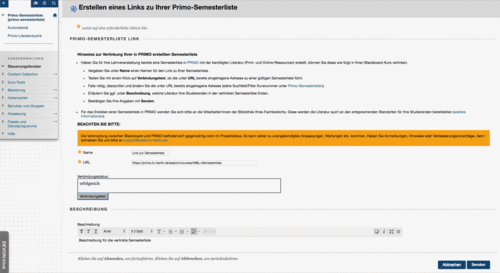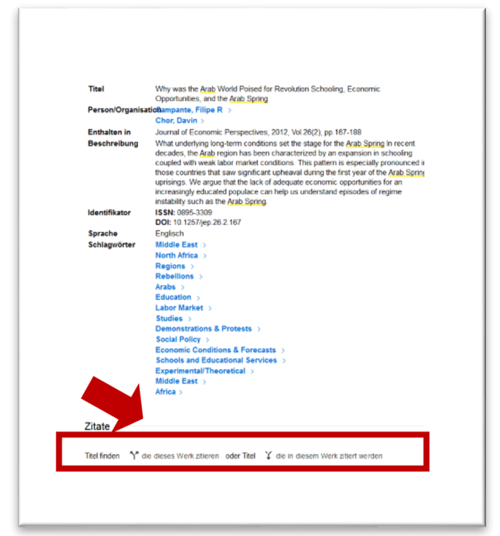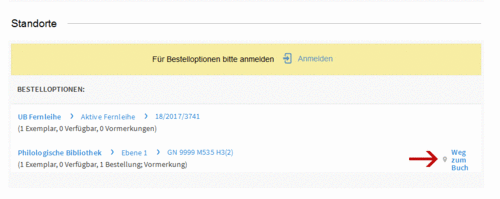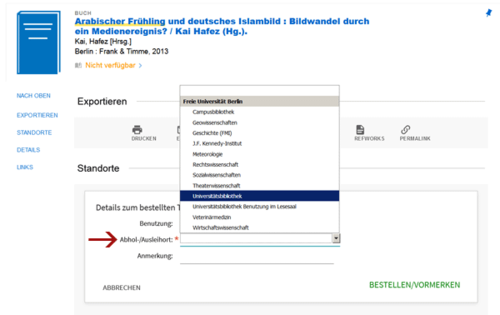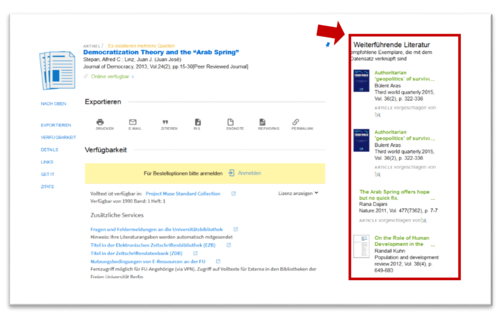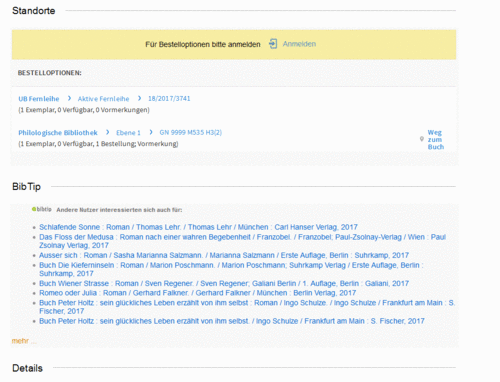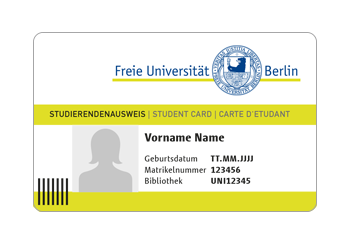Primo A to Z
Any questions?
Staff at the Freie Universität libraries or at the University Library Information Center will be happy to give you support.
The library portal Primo is a so-called discovery and delivery system that is used in libraries across the world.
Primo combines the resources listed in the libraries' holdings database with datasets relating to externally hosted sources provided by institutional repositories and with the mega-index hosted by Ex Libris that contains metadata and full texts provided by various publishers and aggregators.
Libaries can modify Primo to a certain degree to suit their particular requirements.
New Design / User Interface
The developer, Ex Libris, has made the new Primo interface more intuitive by concentrating all information concerning one publication on a single page. The new interface is barrier-free and adapts to mobile devices. Freie Universität Berlin will be using the new interface as of spring 2018.
Browser, JavaScript & SSL 3.0
Browser certification is based on industry usage statistics (W3C). The following table describes the certified browsers:
| Apple® Safari® | The new Primo UI is tested and certified with the most recent stable version of Safari® on Mac®. |
| Google Chrome™ | The new Primo UI is tested and certified with the most recent stable version of Google Chrome. |
| Mozilla® Firefox® | The new Primo UI is tested and certified with the most recent stable version of Firefox® |
| Microsoft® Internet Explorer® | The new UI is tested and certified with the two most recent browser versions for Microsoft® Internet Explorer®: EDGE and IE 11. |
For all browsers, you must enable JavaScript, and SSL 3.0.
On your account page (compare: Registration, User Card / Campuscard) you can monitor your loans, requests, due fees, blocks, messages, and personal information.
Loans
This is where you can see when the loan periods for your loans will end and where you can extend loan periods – if possible.
Requests
This is where you can see your open requests, including hold request for items that are currently out on loan, as well as a list of items that are ready for you to pick up, including information where you can pick them up and how long they will be held for you.
Fines + fees
This is where you can see whether you have accumulated any fees. If your due fees reach 10 Euros, your account will be temporarily blocked.
Blocks + messages
This is where you can see whether your account has been blocked or whether a library has sent you a note.
Personal details
This is where you can:
- change your language settings for the platform (German or English)
- check whether your library card is still valid
- change your PIN (for self-checkout machines)
- and, if you are not a Freie Universität student, change your password
Within the Articles+ scope you will find:
- Journal articles
- Newspaper articles
- Free e-books on external platforms
- Partially/ selected e-books
- Book chapters
- Websites, etc.
Articles+ does NOT cover:
- Printed books in the Freie Universität libraries (s. FU Catalog)
- Printed journals and newspapers in the Freie Universität libraries (s. FU Catalog)
- Databases licenced for the Freie Universität libraries
Notes on the scope Articles+
The basic result set is limited to resources listed in Article+ for which full texts are accessible. Freie Universität members and users at Freie Universität libraries have access to licensed e-resources.
♥ Hint: Check the "Display resources without direct access" box if you want results to be included for which full texts are not accessible. The expanded result list may contain titles that exist in printed editions in the Freie Universität library system or that can be procured from other libraries through interlibrary loan (s. Information about Interlibrary Loan).
♥ Hint: You can customize ranking rules in Articles+.
Many library webpages as well as Blackboard, the learning platform employed at Freie Universität Berlin, incorporate the search box that allows you to directly search the library portal Primo.
Instructors can use direct links in their courses on Blackboard to course reserves defined in Primo.
A separate Primo portal for the Charité libraries is under construction. It will be running with the same software and infrastructure, but the presentation of electronic resources will be adapted to the license conditions as valid for Charité and to Charité's subject areas. The data pools activated in the Articles+ scopes in the Charité and Freie Universität portals are not coextensive.
- Library portal Primo for Freie Universität Berlin: http://primo.fu-berlin.de/en
- Library portal Primo for Charité – Universitätsmedizin Berlin as of 5 March 2018: http://primo.fu-berlin.de/charite
Resources covered on the Charité portal
- Physical items held by Charité and Freie Universität Berlin libraries (complete overlap with FU portal)
- E-resources licensed for Charité (e-books, e-journals)
- E-ressources licensed for both Charité and Freie Universität Berlin (e-books, e-journals) complemented with free e-journals
- Articles+ scope, set up to suit particular Charité requirements
You will not find:
- E-books and e-journals licensed for Freie Universität Berlin only
- Article records from sources such as Wiso or MLA will not show up in the Articles+ scope because those databases are not licensed for Charité, and their content, therefore, cannot be activated on the Charité portal. Furthermore, several data pools that are deemed irrelevant for Charité purposes will not be activated.
For the Articles+ scope, there is a functionality in Primo that directs to articles that either cite, or are cited by, a particular article.
That functionality facilitates finding out which authors cite which other authors, and it can be useful for finding related literature.
Please note: Citation-trail functionality works only for sources in the Articles+ scope the full texts of which are available to the Primo search engine to analyze.
→ Obviously, the citation-trail results cannot, and do not, make any claim of completeness. The intention is not to give an exhaustive documentation of every single connection within the entire world network of academic publications, but to use available data to facilitate discovery of publications.
In order to study citation patterns more thoroughly, use bibliographic databases, such as Web of Science or Google Scholar.
In the Course Reserves scope you will find:
- Books and e-books from the FU Catalog that are relevant for particular courses.
Course Reserves does NOT cover:
- Articles that might be relevant to the course.
Details:
- Course reserves are put together by the course teachers. For more information, s. Course Reading Lists.
- The filters you can apply to the result lists in this scope are: Course name, Course instructor and Course ID. In Advanced Search, you can use those criteria for your queries.
- There are restrictions on loan periods for printed editions in course reserves; in some cases they cannot be taken out at all.
In the Database scope you will find:
- Licensed databases
- A selection of free databases
The Database catalog does not cover:
- Database content
Of course, database records intersect to some degree with records from Articles+. Databases are important for thorough literature search.
Range of databases available at Freie Universität Berlin
The databases provided by Freie Universität are listed in the Datenbankinfosystem (DBIS); the DBIS records are also made available in Primo.
DBIS is a service that more than 300 libraries are involved in. On the DBIS platform, you can use advanced search options and browsing functionality. Among other things, you can display the databases of a discipline via the subject overview. In the advanced search, you can e.g. search for databases on a specific topic or region.
Furthermore, you can deselect Freie Universität Berlin, in order to explore other universities' database portfolios.
If you have not found a suitable database, please contact digibib@ub.fu-berlin.de.
Notifications generated by the library system concerning deliveries, returns, reminders, etc., will all be sent to you by e-mail, except for third reminders, which will be sent by postal mail.
For Freie Universität students, it is exclusively the FU Account e-mail address that will be accepted for all library-system purposes. You can change the ZEDAT-Portal settings if you want to have e-mails forwarded to other addresses.
Other users can change their e-mail addresses in their library accounts at their own convenience.
Service reminders
A few days before a loan period ends and the very last day of a loan period, a reminder will be sent to you by e-mail.
Electronic resources licensed for Freie Universität Berlin
Access to e-ressources licensed for Freie Universität Berlin is restricted to devices connected to the Freie Universität network.
FU members with valid ZEDAT Accounts can access e-resources licensed for Freie Universität Berlin from devices outside the University network. Find information on how to set up access on this University Library webpage:
http://www.fu-berlin.de/sites/ub/literatursuche/zugang/index.html
External users and guests have full access to licensed databases and full texts at computers at the Freie Universität Berlin libraries only.
The computers at the libraries are equipped with USB ports to enable full text downloads.
Electronic resources licensed for Charité
Access to e-ressources licensed for Charité is restricted to devices connected to the Charité network. Also, records for e-resources licensed for Charité will appear on the Charité portal only (compare: Charité – Universitätsmedizin).
You can export bibliographic data (author, title, etc.) for subsequent use as:
- Printout
- E-mail text
- Copy to clipboard of citation in MLA, Chicago, or Harvard format
- File in RIS format for citation-management software
- File in tagged EndNote format for citation-management software
- File in BibTex format for citation-management software
- Copy to clipboard of permalink that facilitates coming back to a certain dataset on the library portal Primo
You will find export options for every title in Primo.
Exporting data from favorites (pins)
If you collect datasets as favorites first, you can then export data for all the titles at once.
Loan-period extensions
You can extend your own loans in your account in Primo. To do so, you must be signed in.
You can select either all titles or individual titles and extend the respective loan periods. If an extension is not possible, you will be given a message by the system.
Extensions are generally not possble for short-term loans, interlibrary loans or items that other users have requested.
You can extend your own loans until you reach the maximum loan period. At that point, the books have to be presented at the Circulation Desk.
Extensions per telephone or e-mail
Go to the Freie Universität library guide to find the pertinent contacts for all libraries.
Favorites serve to collect datasets found in Primo. In order to set favorites click on the pin icon.
The advantage of using favorites is that you can easily get back to datasets resulting from your searches without having to repeat those searches. This would also be an easy way, for example, to put together a list of books that you have taken out or browsed. Also, you can use this functionality to remember books that you want to take out later.
To access your favorites, click on the pin icon above the search box.
Saving favorites beyond one session
Sign in if you want to save items for future Primo sessions. That way you can keep interesting discoveries in Primo and get back to them at a later time. Labeling also requires signing in.
Labeling favorites
You can organize your favorites by labeling them. Simply click on the pencil icon, type in a label name and press the return key. Click on the pencil icon again in order to remove the label.
If you check the checkboxes, you can assign one label to up to 30 datasets at once (pencil icon above the result list).
By clicking on a label name on the right side, you can open all records that you have applied that label to.
Exporting favorites
If you collect records from the library portal Primo as favorites, you can then export up to 30 records at once, so that you can import them into a citation manager, for example (compare: Exporting catalog data).
On the "My Favorites" screen, you will also find your Saved Searches and Search History.
We are working on implementing context-sensitive links from items to relevant libraries, so that addresses and opening hours are easy to find.
In the mean time, please use the Freie Universität library guide.
Locating items
Some libraries provide 2D or 3D wayfinding applications to indicate books' locations. Catalog entries contain respective links in the location panel.
Within the FU Catalog scope you will find:
- Printed books in the Freie Universität libraries
- E-books licensed for the Freie Universität libraries
- Printed journals and newspapers in the Freie Universität libraries
- E-journals licensed for the Freie Universität libraries as well as free e-journals
- Audiovisual content on CD or DVD
- Databases licensed for the Freie Universität libraries (s. Databases)
The FU Catalog does not cover:
- Book chapters
- Journal articles
- Newspaper articles
- Database content
- E-books and e-journals licensed for Charité (s. Charité)
- Free e-books on external platforms
- Websites
We welcome you.
No registration is required for searches on the library portal Primo. In the FU Catalog scope, you can find out what publications Freie Universität Berlin libraries possess and whether they are available.
In order to place regular or hold requests for library items, you need a library card for the Freie Universität libraries, which you will receive free of charge at any Freie Universität library's circulation desk.
Note that in the Articles+ scope, you will not be able to view results from databases such as Web of Science and MLA, for which there are fees even for mere searching.
Full-text access to licensed electronic media at Freie Universität libraries
Guests and external users with library cards can access fulltexts from computers provided by the Freie Universität libraries, but not from their own devices. The library computers are equipped with USB ports.
The Freie Universität libraries process interlibrary loans through the Berlin-Brandenburg library network KOBV.
If a publication is not held at any of the FU libraries, you can request it as an interlibrary loan.
At the bottom of result lists on the library portal Primo, you will find these links:
- Search in libraries in the region
- Search in libraries in Germany (inter-library loan)
- Submit a purchase suggestion
The first two links hand your query over to the KOBV portal, so that you can continue your search either on the regional level, which covers library holdings in Berlin and Brandenburg, or on the national level, which covers library holdings in Germany.
On the KOBV portal, click on „Fernleihwunsch“ (more details on University Library website). When there are more than one identical results, it does not matter which one you select for the interlibrary-loan process. Only the publication data (author, title, etc.) will be transmitted into the actual interlibrary-loan request form.
In most cases the interlibrary-loan software will determine to which library your request will be sent.
Here you can view new acquisitions of the FU libraries incl. Charité of the last 14 days. The linked titles lead you to the detail display in the library portal Primo.
Freie Universität students
Freie Universität students sign it to the library portal Primo with their FU Account credentials, as maintained by ZEDAT (compare Registration, User Card / Campuscard).
To change your password or personal data or to change settings, so that e-mails are forwarded to your preferred address, please go to ZEDAT Portal and use the functionality provided there (compare: ZEDAT FAQs). Note: In order to access electronic media from your own device, you have to connect it to the University network using Eduroam or VPN (see: Terms and Conditions of Use for Electronic Resources Licensed to Freie Universität Berlin on the University Library website).
Users with library cards
Other users are assigned a password when they receive a library card. In that case the password can be changed as part of the personal settings in Primo.
Forgot your password?
Users with library cards can turn to a circulation desk at a Freie Universität library to have a new password assigned. (Please present valid identification.)
PIN
For self-checkout machines, please use the barcode on your student card. Instead of a password, you will need a PIN. For Freie Universität students, the default PIN ist the postal code (Postleitzahl) for the street address as held in the University's student address system). Go to the Personal Details page in the My Account section in Primo to change the PIN.
Peer review is one method of evaluating academic work. Specifcally, manuscripts are subjected to the scrutiny of peers, i. e., independant reviewers who are experts in the same fields as the authors, in order to assure the quality of publications. Peer review is used in most major scientific journals.
In Primo, there is a filter for peer-reviewed journals that allows you to limit results accordingly.
Hint: Get more relevant results for searches in the Articles+ scope by Changing the settings for ranking, so that articles in selected disciplines will be listed higher in result lists.
A permalink is what you want to keep if you think you may want to come back to a specific place in Primo at a later point in time. In contrast to the URLs that appear in your browser's address bar, which include session information that will make the address useless, as your session expires, permalinks are stable URLs.
Primo permalinks can be used, for instance, as distinct pointers to a publication on the library portal Primo. They facilitate going back to results without having to repeat your searches.
Result lists are sorted according to relevance settings defined by University Library specialists (compare: Improving Result Lists).
Form most purposes, the publications listed on the first pages of result lists should be quite satisfying. To modify the order in which journal articles are ranked in the Articles+ scope, you can select the disciplines most relevant for you in your personal Primo settings.
To do so, click on "Personalize" on top of the result list in Articles+ scope.
Consider the following example to get an idea of how you can expect to improve the ranking for relevant articles, depending on your selection of disciplines:
Search term: drone ↔ Discipline: either Biology or Political Sciences
Primo will display articles from journals in the selected disciplines higher on the result list.
Regular requests, hold requests, selection of pickup locations
When you place a request, you can specify to which Freie Universität library you want to have it delivered for you to take out on loan. (Exception: You cannot have items delivered to the Philological Library). There is a list of the possible pickup locations in the request form.
Remember: Request and hold options appear in the library portal Primo only after you have signed in and only for items for which placing a request is either possible or necessary. As a rule, that will apply to items in closed stacks or items that are currently out on loan and not to items in open shelves. Note that items in the University Library are a special case because you can either retrieve them yourself or request them.
For which items is it not possible to select pickup locations?
Please note that you have to retrieve all items from the shelves yourself that you want to take out on short-term loans or weekend loans. The same applies to items that are excluded from circulation and to items in open shelves, which users generally have to retrieve themselves. Also, special holdings, such as protected or rare materials, are excluded from book transportation and, in most cases, can only be requested to be used in special areas of the respective library.
Inter-library loans are always processed through the University Library only.
The Philological Library cannot be selected as a pickup location for items belonging to other Freie Universität Libraries.
Delivery times – e-mail notifications on delivery
Please factor in that transportion to your selected pickup library will take one to two days. You will receive an e-mail to let you know when the item has been delivered and how long it will be on hold for you.
Returns possible at all Freie Universität libraries
You can return Freie Universität library items at any Freie Universität library, regardless of where they were taken out – except for inter-library loans, which have to be returned to the University Library.
Note: Self-checkout machines can process items belonging to the respective library only.
Note: There is no transportation between Freie Universität libraries and the Charité libraries.
Is there a book, a journal, a database that you think the University Library or one of the department libraries should consider acquiring?
Please complete the purchase suggestion form on the UB homepage.
Sign in and complete form
A valid library card or, for Freie Universität students, a Campuscard are required. Some fields like email or name are mandatory.
You will find the link to the suggestion form also at the bottom of each Primo result list.
Personal requirement?
In completing the form, you can specify whether you require the publication personally and want to take it out or read it or whether the intention behind your suggestion is simply to draw attention to an important publication missing from the library holdings (in which case the book will not be put on hold for you when it has been acquired).
Notification about purchase decision and delivery
You will be informed by e-mail whether the publication will be acquired or not. If the publication is acquired and in case you specified that you require the publication personally, the libraries will try to make it available for you as fast as possible.
bX – recommendations of articles
For many sources listed in Articles+ recommendations of articles are displayed that may be relevant to the same topic area. The machine behind that service is bX Recommender, a system developed by the Primo developer Ex Libris.
The bX recommendation algorithm is based on anonymous usage data that is collected from academic institutions around the world; by anlyzing the usage data, the system identifies articles that have been downloaded in one same session.
BibTip – recommendations of books
BibTip is a book recommender incorporated in the FU Catalog scope in Primo.
BibTip generates links to related sources by statistically analyzing anonymously collected user behavior during searches.
Freie Universität Berlin students
- For Freie Universität Berlin students, either their valid student card or, in most cases, as of 2017, the CampusCard is concurrently the user card for the FU libraries. For signing in, Freie Universität students use their FU account credentials.
- FU Students can redirect emails to their preferred addresses on the ZEDAT-Portal.
Other users
- Users officially registered in Berlin or in Brandenburg can obtain user cards for all Freie Universität Libraries at no charge on presentation of identification (Personalausweis; or passport in combination with official proof of residence (Meldebescheinigung)), which entitle them to take out books on loan.
- The original password for signing in to electronic services is normaly the date of birth in ddmmyy format, but for cards obtained from 2017 onward, it is ddmmyy, followed by the first letter of the user's last name, followed by an exclamation mark. The original password can be changed in the account-settings menu.
- Users who are residents neither of Berlin nor of Brandenburg, can obtain guest user cards at no charge on presentation of identification, which entitle them to request items to the Reading Room.
- Libraries will send notifications to the e-mail address specified in the users' accounts.
Loss of user cards / Campuscards
Loss of user cards / Campuscards must be reported to the library without delay (University Library Information Desk, telephone: (030) 838-52265), so the pertinent user account can be blocked, in order to prevent abuse.
On the library portal Primo, item locations, shelf numbers and availability can be looked up for items in the Freie Universität libraries. Some items can be taken out on loan, others can be used on site only.
Information on loan periods and request options
You need to sign in, in order to see Information on loan periods and request options. The "Request" button appears only for items that have to be requested from closed stacks or that are currently out on loan and for which hold requests can be placed.
Selecting pickup locations
In most cases, when you request an item, you can select the pickup location, and the item will be delivered to a Freie Universität library according to your selection.
Self-retrieval
Please retrieve items in open shelf display from the shelves yourself.
The University Library open stacks are a special case: You can either retrieve items from them yourself, or you can request them.
- What kind of publications do the different scopes in Primo cover?
- How can I optimize my queries?
- What should I know when I am looking for literature in Arabic, Persian, Hebrew, Chinese, Japanese, or Korean language?
- How can I search literature by topic?
- How can I find out what books have recently been acquired by the Freie Universität Libraries?
- How can I use filters in Primo, in order to find more relevant literature?
- What can I do if I cannot find what I am looking for?
To find answers to these questions click on Search Hints in the navigation menu at the top of the page.
During each session in Primo, your searches are recorded in the Search History, so that you can reiterate them.
If you are signed in to Primo, you can save any search from the Search History of the current session by clicking on the pin icon. That way you can repeat that search in future sessions at any later point in time.
Set up e-mail alerts
You can have Primo send you alerts when there are new sources in the database that match your query.
Note: Unfortunately alert functionality is currently not running satisfactorily for books in Freie Universität libraries: To some degree, alerts will include not only new acquisitions, but also dated publications that you have already taken notice of.
Open display – no need to request
Items in open-shelf areas should be retrieved from the shelves by the users. Look up the shelf number of the item you want to use, so you can find the book at its location. No request options are displayed in Primo for such items (except for those in the University Library Open Stacks – see below). Information on loan options (outside loan, reading-room loan, loan periods) for items and request options are displayed only after you have signed in to Primo. Request options are displayed only for items for which a request is possible.
University Library Open Stacks – both self-retrieval and requests possible
The University Library Open Stacks are a special case: You can either retrieve books yourself or request them.
Reading Rooms
Reading-room items, as a rule, are excluded from loan (as so-called non-circulating holdings). You will have to read such items on site or make photocopies, as needed.

